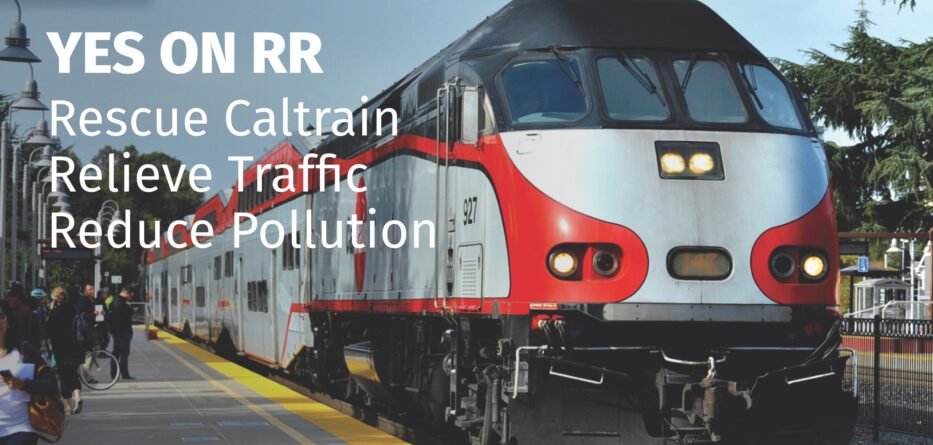SAN FRANCISCO — COVID-19 is hitting everyone hard, including Caltrain, the Bay Area’s commuter train line.
On Nov.3, Measure RR will give voters in San Francisco, San Mateo and Santa Clara counties the opportunity to bring Caltrain back from the brink of closing down.
Before COVID, the train system was carrying 65,000 riders – 4,600 per hour each way, on average – between its 32 stations on tracks stretching from Gilroy to San Francisco. By doing so, it was replacing an estimated four freeway lanes’ worth of traffic and 400 million driving miles every year.
On a daily basis, that’s 10,000 vehicles on Bay Area roads and 200 tons of carbon dioxide in the air that Caltrain’s presence eliminates.
But with COVID, Caltrain has lost 95% of its ridership, and is in danger of having to shut down.
With their fares, passengers provide about 70% of Caltrain’s operating budget. The rest comes from San Mateo, Santa Clara and San Francisco counties, all of whom are facing their own economic struggles this year and are not obligated to contribute. The funding formula is based on matching contributions from each county augmented by a calculation of the percentage of Caltrain riders from each.
That arrangement was made when local governments took control of the system after Southern Pacific decided to opt out of the commuter train business in the 1980s and was considering closing down the system, the seventh-largest train system in the country and a fixture of Bay Area transportation for more than a century (1863).
A slight majority of Caltrain riders identify as Asian (40%), Latinx (12%), or Pacific Islander, American Indian, Middle Eastern or other, with the remaining 48% white, according to Caltrain’s most recent survey, in November 2019 (https://tinyurl.com/CaltrainRiders).
The popularity of commuter trains has risen and fallen over the years. For instance, although ridership doubled between 2005 and 2015, Caltrain had to make cutbacks during the recession in 2010, but the availability of public transit has been key to planning decisions on where to build housing on the Peninsula, and helpful in an era of growing concern over climate change.
Passing Measure RR will require support from two-thirds of the voters in San Mateo, Santa Clara and San Francisco combined. It calls for an eighth-of-a-cent — .0125% — increase in sales tax for the next 30 years, with food and medicine exempted, along with other necessities.
Measure RR is expected to provide $108 million annually. Currently, Caltrain is running an $18.5 million deficit after receiving $41.5 million from the federal CARES Act earlier this year.
Surveys show that at least 70% of Caltrain’s passengers expect to get back on board once the pandemic recedes, but if the train system does shut down, getting it restarted will be costly and time-consuming – more than two years and $150 million, according to one independent estimate (https://tinyurl.com/CaltrainRestart).
Advocates point out that most transit systems already have “dedicated” funding sources that Caltrain does not, and that providing one such as Measure RR proposes will enable Caltrain to keep running and eventually proceed with plans (https://caltrain2040.org) to modernize, expand the frequency and geographic reach of its trains and provide greater access via reduced fares for target populations such as students, seniors and working-class passengers, who disproportionately rely on public transit.
Caltrain is currently offering low-income riders a 50% discount in a pilot program that Measure RR funding would allow to continue. The funding would also allow Caltrain to expand the train system’s utility to underserved communities by running more trains at midday and other non-peak commuter times, improving access to other transit systems and to bicycle riders and by staving off future fare increases.
“Caltrain is an absolutely critical part of the Bay Area transportation system, and shutting it down would be catastrophic for our economy and our working families,” said Assemblymember David Chiu, who represents San Francisco. “It’s our responsibility to ensure that Caltrain isn’t another casualty of this devastating pandemic, and do whatever we can to preserve public transportation for all of our citizens.”
Measure RR has garnered endorsements throughout the communities and businesses Caltrain serves – from Sen. Dianne Feinstein, the mayors of San Francisco, San Jose, Palo Alto, Brisbane, Burlingame, Mountain View, Sunnyvale, San Carlos, Portola Valley, Los Gatos, to the Sierra Club, Sustainable Silicon Valley, the South Bay Labor Council, the League of Women Voters of the Bay Area and the Bay Area Council and more (https://tinyurl.com/MeasureRREndorsements). Also on board are newspapers including the San Francisco Chronicle, San Mateo Daily Journal and San Jose Mercury News.






